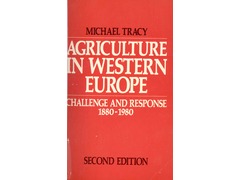France
Documents from [1762] to [1939]Identity Statement
5 files
Carr, Mary
Content and Structure
The French Revolution while it rid France of feudalism, did not mark any great changes in the structure of French agriculture, farms remained small and as the rural population grew, holdings became even more fragmented. On such small holdings, progress was virtually impossible, this coupled with the peasant's reluctance for change created a stalemate in French agricultural modernisation.Structural deficiencies were not the only problem, the lack of education and resources available to peasants meant that improvements couldn't be carried out. In fact, French agriculture was left untouched by the industrial revolution and by the time they were prepared to modernise, they had been surpassed by their continental counterparts. By the rest of the French population, peasants were considered backword and rural communities remote, which meant that new cultivation methods and other farming techniques were only passed onto them when rural education reforms were passed by Jules Ferry in the 1880's.
Furthermore, French agriculture had been historically protectionist. It was only due to Napoleon III's efforts to establish free-trade that the Anglo-French Treaty was introduced in 1860 and between 1861 and 1867, other trade treaties were established with European nations. However protectionism was revived due to an agricultural depression. In 1881 a new tariff was adopted, the Société des Agriculteurs de France was disappointed with this tariff and campaigned for greater restrictions. In October 1890 the government put forward new tariff proposals which were submitted to the Tariff Commission. Subsequent discussions were dominated by Jules Méline, a former Minister of Agriculture and fervent protectionist. Méline was President of both the Agricultural Group and the Tariff Commission. The resulting Tariff that was put into law in 1891 bore his name: the Méline Tariff. This tariff remained virtually the same until the outbreak of the first World War due mainly to the role played by the elitist Sociéte des Agriculteurs de France in formulating agricultural policy, even though French peasants were beginning to get organised and become more active politically. Méline was the predominant personality in promoting the Société. His philosopy was "return to the soil", and his interest in agriculture is evident in that he held the positions of Prime Minister and Minister for Agriculture simultaneously from 1896-1898, certain agricultural reforms he also carried out but protection, particularly tariffs for wheat were his main priority. Whatever the benefits for big farmers as a result of protectionism, for the small farmers the benefits were few. The main criticism was that attention was diverted from where it was really needed, ie. in a long-term agricultural policy, farms remained small, no incentives were given to peasants to invest. The need to promote self-sufficiency for war-time situations, particularly after France's defeat in the Franco-German war was used by protectionists to justify their policies. By the time of the outbreak of the first World War, France was producing 90% of its food requirements, but it served no long term benefit, as the war meant a fall in production, shortage of labour and lack of machinery meant that France had to begin to import sugar, wheat and meat. The war destroyed French Agriculture efforts to deal with the rise of the cost of living, the pre-war tariff was re-introduced in 1919, however little else was done to re-organise th
It was only in the 1930's that French peasants began to get really organised, they had learnt from the war experience and realised how inadequate were their methods and the need for technical progress, they were at last beginning to be seen as an important lobby group, however the conflicts between the various agricultural organisations on the long-term policy to be adopted guaranteed that more time would have to pass before their views would be taken seriously.
Conditions of Access and Use
Allied Materials
Notes
See Michael Tracy's book: Government and Agriculture in Western Europe 1880-1988, 3rd ed. (1989)
